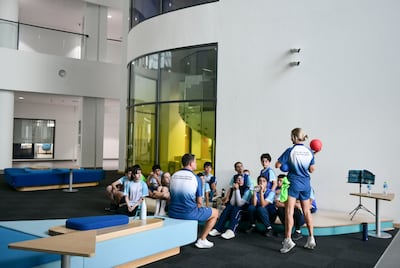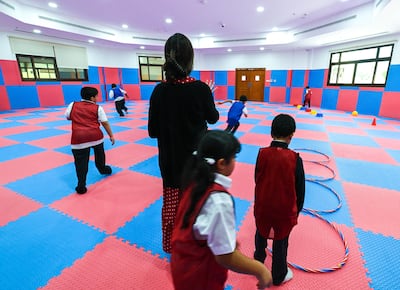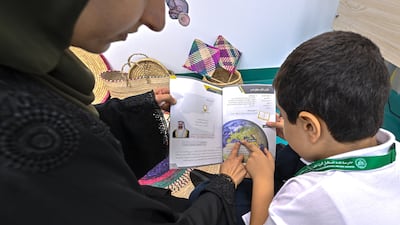Abu Dhabi has opened 11 new private and charter schools to help meet the needs of a growing pupil population amid a nationwide education sector boom.
About 15,000 extra school places were created and more than 450 teachers hired for the start of the new academic year as part of a major drive to deliver top class education across the capital.
Abu Dhabi's new schools are championing affordable education, embracing technology, supporting families through flexible start times and joining forces with leading global institutions to help shape young minds.
Here, The National takes a closer look at the new Abu Dhabi schools serving thousands of pupils.
Nord Anglia International School Abu Dhabi

Nord Anglia International School Abu Dhabi is taking a forward-thinking approach to learning to help unlock the potential of its pupils.
The UK curriculum school is broadening the horizons of pupils by working with global education leaders such as Massachusetts Institute of Technology and The Juilliard School, in New York, as well as Unicef.
The school has a flexible day so pupils can choose to come in early at 7.30am for a morning enrichment programme where they can do yoga, sports or have breakfast, or opt for a later start at 8.30am.
NAS Abu Dhabi has 350 pupils enrolled and aims to have about 400 by January 2024, as admissions are still open.
Fees range from Dh65,000 in foundation stage one to Dh95,000 in year 13.
“This is a school that is based on taking the best research that is out there and creating a really dynamic and open learning environment,” said its principal Liam Cullinan.
“We've created the equivalent of Charlie and the Chocolate Factory and Willy Wonka's magical world of imagination, where every space is an experience for our pupils."
“We've got our dynamic partnerships with MIT, The Juilliard School [in New York] and with Unicef, which has allowed these partnerships to drive the curriculum and write the curriculum for us.”
For example, teachers are trained in how to observe pupils and tailor the curriculum to best meet their needs.
School timings are from 8.30am to 3.30pm but the school has flexible hours, which means pupils can be there from 7.30am to 5pm – with optional activities available after the last class of the day.
The school has a later-than-usual start to the school day. While most schools in Abu Dhabi open around 7.15am, NAS Abu Dhabi starts at 8.30am.
“We have developed this concept to respond to the flexibility families need, the routines pupils need, and ensure that young individuals, particularly those who commute by bus, get enough sleep,” said Liam Cullinan.
“Our curriculum is driven through child-led learning and that's the kind of framework running through the school, where all of our classrooms are joint classrooms that can encourage collaboration between different classes.”
He said pupils at the school were digital natives. NAS Abu Dhabi also focuses on traditional learning through reading and literature, with a library running through the middle of the school.
Future Leaders International Private School Rabdan

The American curriculum school has 50 pupils enrolled in its first year and is still taking admissions.
Ghazwa Mohammed, principal at the school, said its location in a residential community was a big draw.
“There isn't any other private school in the area at all, so it will serve the community in this area,” said Ms Mohammed.
The school has a total capacity of 1,500 and Ms Mohammed aims for it to have 700 pupils in classrooms by August 2024.
Fees at the school range from Dh23,000 at kindergarten level to Dh25,000 in grade four.
“We use play-based curriculum where students learn through investigation and age-appropriate activities. We offer art and music and focus on a holistic approach and on social and emotional aspects,” said Ms Mohammed.
“We build leadership skills for our pupils, so we don't only focus on academic, which is a priority, but on different capabilities, talents and interests.”
Al Falah Academy Abu Dhabi and Al Falah Academy Al Ain
At Al Falah Academy Abu Dhabi and Al Falah Academy Al Ain, the annual tuition fee is Dh4,000 across all grades, ensuring access to affordable education for a large number of families.
The schools offer the Ministry of Education curriculum and place emphasis on Arabic language development, science and numeracy, social studies and the English language.
The schools aim to provide education opportunities for pupils from low-income families who face obstacles in gain access to education.
Seven new charter schools open
Seven new charter schools opened for the start of the academic year, in a further boost to a rapidly-expanding education initiat8ive.
Charter schools work on the public-private model, under which the government builds the infrastructure and then allows a private partner to manage the school.
Currently, 50,476 pupils are enrolled at charter schools in Abu Dhabi.
Abu Dhabi's Department of Education and Knowledge said the new charter schools to open this term were Al Bayan School and Atfal Al Emarat in Bani Yas, Al Hosoon School in Mazyad, Mubarak bin Mohammed School in Al Manhal, Al Ghaf School in Al Khibeesi, Al Qeyam School in Al Shamkhah and Seer Bani Yas School in Al Danah.
Additional Reporting by Salam Al Amir


